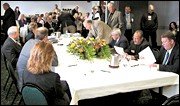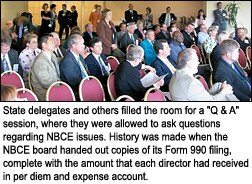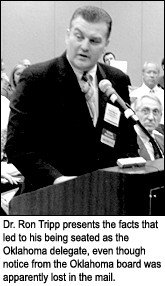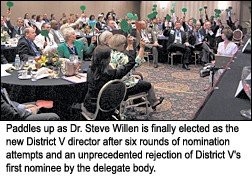A new tradition began when NBCE state delegates insisted on being present at the historically closed board meeting where the at-large directors and officers are elected.
History was made repeatedly at the 2006 National Board of Chiropractic Examiners (NBCE) meeting.
Before the annual meeting began, there was a heightened level of communication between the directors, the media and other organizations.1 The issues of governance, transparency and financial disclosure were at the forefront.
 Prior to the arrival of the state delegates, the NBCE board of directors voted on and passed a proposed reduction in exam fees that would be effective for the 2007 exams. Unlike the reduction approved at the end of last year (reported in the Jan. 1, 2006 issue of DC)2, the motion was passed without noting any specific amount by which the fees would be reduced.
Prior to the arrival of the state delegates, the NBCE board of directors voted on and passed a proposed reduction in exam fees that would be effective for the 2007 exams. Unlike the reduction approved at the end of last year (reported in the Jan. 1, 2006 issue of DC)2, the motion was passed without noting any specific amount by which the fees would be reduced.
 There was a definite air of intensity that one could sense as the delegates arrived. The previous few months had brought numerous issues to light. While there was ample opportunity to discuss these issues in the hallways, the first formal opportunity was at a "Q & A" session on May 5, the morning before the annual meeting. It was at this session that the first of several historic events took place.
There was a definite air of intensity that one could sense as the delegates arrived. The previous few months had brought numerous issues to light. While there was ample opportunity to discuss these issues in the hallways, the first formal opportunity was at a "Q & A" session on May 5, the morning before the annual meeting. It was at this session that the first of several historic events took place.
In the past, the NBCE has filed its IRS Form 990 without including the per diem and expense account allowances for the directors on the form.3 While this is technically in compliance with IRS regulations, the result was that the delegates and even some NBCE board members did not have complete access to board expenses through the 990 or any other public documents.
However, not only did the NBCE's new 2005 Form 990 contain the detailed information, but then-Treasurer Kenneth W. Padgett, DC, proceeded to hand out copies of the 11-page filing to all attendees.4 And while an exact breakdown by director of the amounts spent on airfare, accommodations and other travel expenses was still not provided (only the per diem and expense account figures are broken down on page five of the form), Dr. Padgett was very willing to answer questions posed by the state delegates.
The next historical events came at the annual luncheon, where the state delegates were to vote on two district elections and proposed bylaws amendments. Before that could take place, an issue arose regarding the seating of Ron Tripp, DC, and Shayne Javersak, DC, the delegate and alternate, respectively, appointed by Oklahoma. The board's appointment letter apparently had been lost in the mail. In a split vote, the NBCE's Credentialing Committee decided not to seat the Oklahoma delegation, which eventually resulted in an appeal on the assembly floor. With no opposing votes, the delegate body seated Dr. Tripp.
 The District III (Northeastern states) election ran smoothly. The District III delegates nominated Mary-Ellen Rada, DC, from the New Jersey state board to replace Vernon Temple, DC, whose term had expired. Upon nomination by the District III delegates, the full body of 41 registered state delegates elected Dr. Rada. The election of Dr. Rada marked the first time two women have occupied concurrent terms as NBCE directors. It was only four years ago that the first woman, Julia McDaniel, DC, was elected to the board as an at-large director, followed by Donna Craft, DC, who currently holds that seat until next year.
The District III (Northeastern states) election ran smoothly. The District III delegates nominated Mary-Ellen Rada, DC, from the New Jersey state board to replace Vernon Temple, DC, whose term had expired. Upon nomination by the District III delegates, the full body of 41 registered state delegates elected Dr. Rada. The election of Dr. Rada marked the first time two women have occupied concurrent terms as NBCE directors. It was only four years ago that the first woman, Julia McDaniel, DC, was elected to the board as an at-large director, followed by Donna Craft, DC, who currently holds that seat until next year.
The election for District V (the South) was a different matter altogether. With 10 registered district delegates, the first vote for the district nomination resulted in a 5-5 tie between the incumbent vice president, Rick Murphree, DC, and Steve Willen, DC, of the North Carolina board. The second vote for the nomination also resulted in a 5-5 tie. The third round went 6-4, giving Dr. Murphree the District V nomination. But when the full body of state delegates voted, Dr. Murphree came up short of the necessary 21 votes required to be elected.
Never in the history of the NBCE had the delegates rejected a candidate nominated by a district. But a recent editorial by former NBCE state delegate James Edwards, DC, told the state delegates that if they didn't like the director nomination from District V, they should "keep your voting paddle down when the vote is taken!"5 The delegates sent District V back into caucus to nominate a new candidate. After three more votes, District V finally nominated Dr. Willen, who was elected overwhelmingly by the delegate body.
 Next on the agenda were the proposed bylaws amendments, which were presented as a combination of amendments that the state delegates could neither modify nor vote on separately. Included were term limits for district directors as well as the removal of the delegate body's ability to elect the district delegates. As explained by the chair, it was an "all or nothing vote." Again, the state delegates expressed their frustration with the status quo: Not a single delegate voted for the bylaws amendments proposed by the board.
Next on the agenda were the proposed bylaws amendments, which were presented as a combination of amendments that the state delegates could neither modify nor vote on separately. Included were term limits for district directors as well as the removal of the delegate body's ability to elect the district delegates. As explained by the chair, it was an "all or nothing vote." Again, the state delegates expressed their frustration with the status quo: Not a single delegate voted for the bylaws amendments proposed by the board.
The next day's educational program hosted by the Federation of Chiropractic Licensing Boards included closing remarks by Louis Sportelli, DC, president of NCMIC. His address focused on the issues at hand:
"Without pulling any punches at this point there appears to be a crisis of leadership. In an era when we're subjected daily to news of inappropriate and even criminal behavior by boards at Enron, WorldCom, Tyco and many other companies, it's more important now than ever to shed light on our conduct and ensure that organizations make the changes necessary to be deemed 'incorruptible' from any point of view. It is especially important for nonprofit organizations which do not have to legally comply yet (notice I said yet) with the most stringent standards of conduct imposed by law, to self-determine and self-impose procedures and protocols to meet or exceed those standards voluntarily. Proactively demanding transparency and disclosure is perhaps the most lethal weapon any board can have to defeat allegations whether they are spurious, whether they are true or whether they are somewhere in-between."6
Encouraged by the address, and the previous day's success, the state delegates made another bold move. The NBCE board historically conducts the first meeting of the new board the day after the annual meeting. It is during this meeting that the board elects the at-large directors and the officers. Never before has any observer or non-board member been allowed to attend other than staff.
Almost 50 state delegates and others actually entered the meeting room ahead of the board members and waited for the meeting to begin. When they were told by then-chair Frank Hideg, DC, that the meeting was closed and they would have to leave, the delegates loudly challenged the appropriateness of the action. When Dr. Hideg decided to allow them to stay, history was again made and a new tradition of openness began.
The first at-large director seat to be voted upon was that of then-Treasurer Ken Padgett, DC. To his credit, Dr. Padgett apparently recognized the desire of the delegates to seek reform and chose not to be nominated for another term. In his place, he nominated Earl Wiley, DC, from the Ohio state board. Dr. Wiley was unanimously elected by the 11 board members. A thoughtful and outspoken proponent of ethical conduct, Dr. Wiley has been actively involved in regulation for many years. The NBCE board took another step toward diversification with the election of its first black director.
Following suit, then-President Peter Ferguson, DC, also chose not to be nominated for another term as at-large director. Former District III director Vernon Temple was ultimately elected to the position and subsequently as president.
The elections for NBCE officers resulted in a completely new slate:
Chair: Steve Willen, DC
President: Vernon Temple, DC
Vice President: Jerry Blanchard, DC
Treasurer: Ted Scott, DC
Secretary: Mary-Ellen Rada, DC
Needless to say, the NBCE delegates made many changes in just two days. But most observers agree that this is just the beginning. Along with new leadership, the board enjoys fresh blood and fewer "old guard" members. Only two of the current directors have been on the NBCE board for more than 10 years: Dr. Hideg for 28 years and Dr. Blanchard for 11 years. Both of their terms expire next year.
While much will be said about this year's NBCE annual meeting, perhaps the best comment thus far is that what occurred was "democracy in action." The delegates became aware of the issues, made prudent inquiry and took action accordingly. They refused to be dictated to or marginalized, even though the current bylaws don't necessarily grant them the level of involvement they are now seeking. They found their voice and are ready to actively participate in the future of the NBCE.
References
- Please see just some of the correspondence at www.ChiroWeb.com/NBCE.
- NBCE reduces exam fees. Dynamic Chiropractic, Jan. 1, 2006. www.chiroweb.com/archives/24/01/14.html.
- Please see a copy of the NBCE 990 filing for 2004 at www.ChiroWeb.com/NBCEreform.
- Please see a copy of the NBCE 990 filing for 2005 at www.ChiroWeb.com/NBCEreform.
- Edwards J. Do the right thing: keep your paddle down! Dynamic Chiropractic, April 24, 2006. www.chiroweb.com/archives/24/09/07.html.
- Dr. Sportelli's entire address can be found at www.ChiroWeb.com/NBCEreform.
Dynamic Chiropractic editorial staff members research, investigate and write articles for the publication on an ongoing basis. To contact the Editorial Department or submit an article of your own for consideration, email
.




